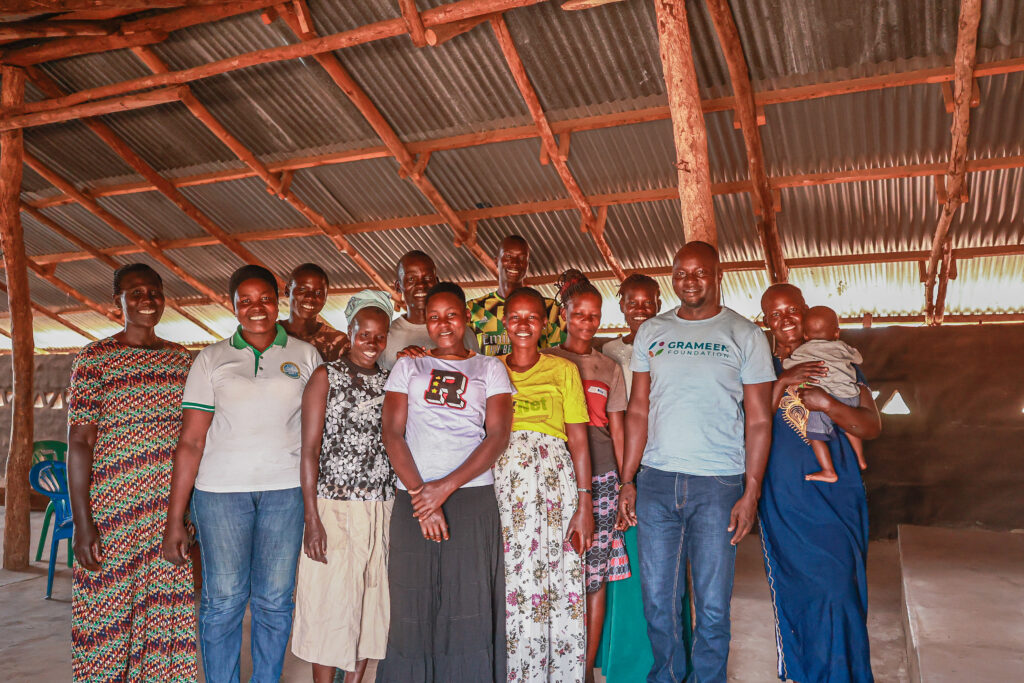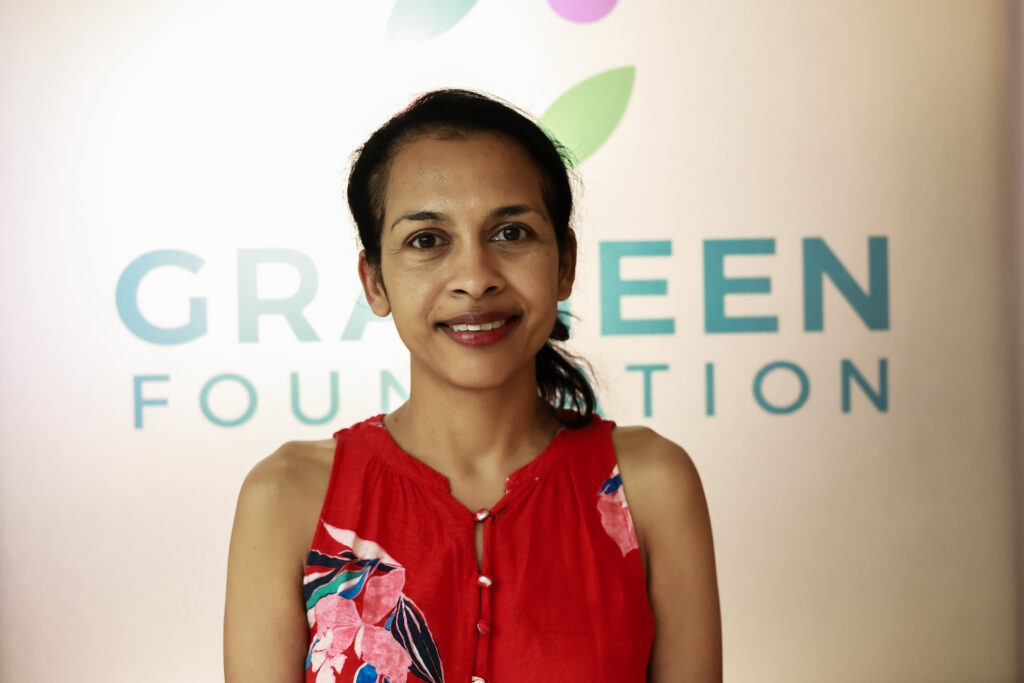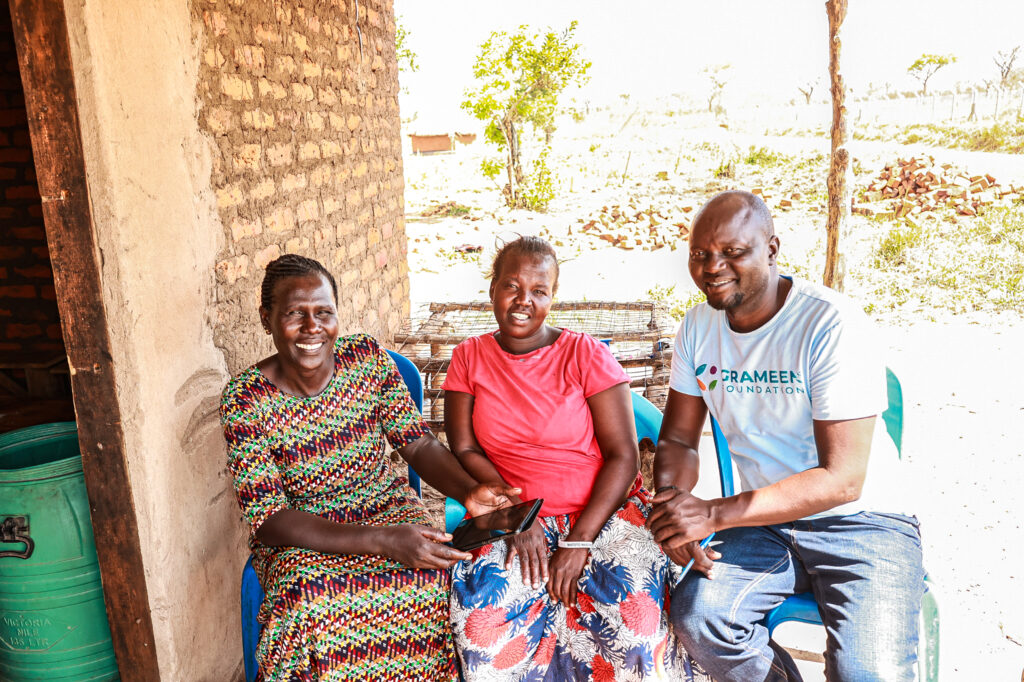
Search

The dusty road to Palabek Refugee Settlement in Northern Uganda is populated with so many signboards for international and local NGOs that you may think there are more humanitarian organizations than businesses in the area. But as you learn more about this unique refugee settlement, you realize that many of the non-profit organizations are supporting the development and growth of businesses in the community through financial inclusion, especially micro-enterprises, to actually reduce their dependence on humanitarian aid.
In a country well-known for their acceptance of refugees, Palabek is one of the newer and less populated refugee settlements in Uganda. Established in 2017, and primarily accommodating refugees from South Sudan, Palabek also stands out as one of the more innovative, with a greater focus on livelihood generation and integration with the surrounding communities. The Grameen Foundation is one of the key organizations leading the way for livelihood development for the camp’s residents.
Through the USAID-funded Uthabiti program, Grameen Foundation, along with partners such as Save the Children and Swisscontact, is helping build the resilience of refugees through market-led livelihood opportunities by enabling greater access to financial services, assets, products, and business support. Grameen’s portion of the Uthabiti project focuses on providing training and loans to Village Savings and Loan Associations (VSLAs) and their members, who are primarily women entrepreneurs.
Refugees, especially women, face immense barriers to accessing financial services, limiting their economic opportunities. Many of them join VSLAs, informal savings groups that provide their members with small loans for life expenses and small businesses investments. However, many VSLAs can be poorly managed due to lack of training and experience. More effective and formalized VSLAs, on the other hand, are better positioned to secure and administer loans from local microfinance institutions, thus being able to provide more capital to their members, and in turn, empowering them to create and grow larger businesses. Grameen Foundation’s intervention aims at providing VSLAs with trainings and subsequently linkages to the financial services that can transform their members’ lives.

Grameen’s field teams are the primary agents of change in the Uthabiti program. Their CBTs (Community-based trainers) are tasked primarily with registering and providing a series of trainings to VSLAs in the refugee camp, focused on proper management, business mentoring, and using mobile technology to accurately manage their savings and loans. Data is critical to this process – tracking VSLA attributes, members, location, training attendance, and their performance enables proper monitoring to ascertain when groups are ready to receive new loans. We are proud that Grameen Foundation has been utilizing TaroWorks to capture this vital data, but it wasn’t always this way.
Previously the CBTs were using paper forms to track their activities. But this led to a myriad of challenges that limited their effectiveness and slowed down both the support given to VSLAs, and the delivery of their Monitoring and Evaluation (M&E) inputs. On our visit to Palabek, we spent time with two CBTs, Jackie and Charles, and the VSLA Program Coordinator, Geoffrey, to learn about their experience before and after the introduction of TaroWorks in the program. Using paper forms, Jackie and Charles were both frustrated repeatedly that their work would sometimes not be accounted for. Paper forms could get misplaced at many points between data capture in Palabek and data analysis hundreds of miles away in Kampala. In those situations, the CBTs would not get credit for their efforts and would have to repeat work. On the other end, for the M&E team, data could be inaccurate and this would not be discovered until weeks later.

When we asked Jackie and Charles how they feel now that they are using TaroWorks, both of their eyes lit up. Jackie told us that she feels more organized and productive, even more focused and committed to the project. Charles also told us, “I finally feel that I’m doing the right things.” Both felt they could now conduct their work faster, more efficiently, cover more groups, and provide better training and support to the VSLAs. VSLA members also were able to go through trainings faster, allowing them more time for their livelihoods. As a result, they have witnessed greater success with the VSLAs, citing 5x increases in their members’ savings thanks to the small group loans the VSLAs are now able to receive through digitization. You could see that they felt empowered to do their jobs well and make a positive impact in their community.


We were also privileged to meet with Bindi Jhaveri, the Snr. Technical Director for the project, in Kampala to understand her perspective on the impact of TaroWorks on the project. She mentioned that using the TaroWorks solution, the Uthabiti team has been able to identify and digitize 140 VSLAs in Palabek camp and have started registering individual borrowers as well. We asked her how TaroWorks has supported the program achieve these results:
“The main benefit of TaroWorks is that CBTs can be in the field and they’re able to collect data and we’re able to instantly see their data and analyze it on dashboards in Kampala. Before it could take over a month to collect and analyze paper-based data, but now we can do it instantly.
The other benefit of TaroWorks is the performance management capabilities. We can require our field staff to enter data directly in the field and then GPS their locations. That way we can see that they’re actually in the field and we can prove their performance.”

At the end of the day, it all comes down to impact on the program participants in Palabek. While in the camp, we also met with Isabella, a South Sudanese woman who is a member of one of the VSLAs that Uthabiti supports. Isabella tells us that she arrived in the camp in 2017 with her 5 children, escaping the escalating civil war in South Sudan. With no money and no prospects, she joined her first VSLA in 2018 and began receiving small loans to start a business selling snacks under a tree and walking around door to door. An astute businesswoman, Isabella was able to gradually increase her profits, pay back her interest and loans, increase her savings, and join a new VSLA every year.

After 5 years of saving through VSLAs, Isabella was finally able to afford to build a bricks-and-mortar shop, where she is now able to sell a wider range of products, and take advantage of the clientele from the school across the road. Her micro-enterprise has also enabled her to pay for school fees for all of her children. She now has ambitions to expand her shop, and send her eldest daughter to school for midwifery. And she will soon be in a position to secure an individual loan from a local microfinance institution in addition to what she gets from the VSLAs. Through the VSLAs and mentorship she has received from Uthabiti, Isabella is pulling herself and her family out of poverty.
In summary, for Grameen Foundation and their Uthabiti program, TaroWorks helps to empower their field staff to provide more efficient and better training and support to VSLAs, who in turn can secure loans and increase their members’ savings, putting their families on a path to overcome extreme poverty – all while improving impact measurement for the program team, and reporting to their funders. We wish the Grameen Foundation team continued impact and success with Uthabiti, and hopefully an opportunity to scale the project in the future to more refugee camps in Uganda!
Thank you to Grameen Foundation for this visit and for sharing your amazing story!

POST TOPICS
Sign up to receive emails with TaroWorks news, industry trends and best practices.
TaroWorks, a Grameen Foundation company.
Site by V+V